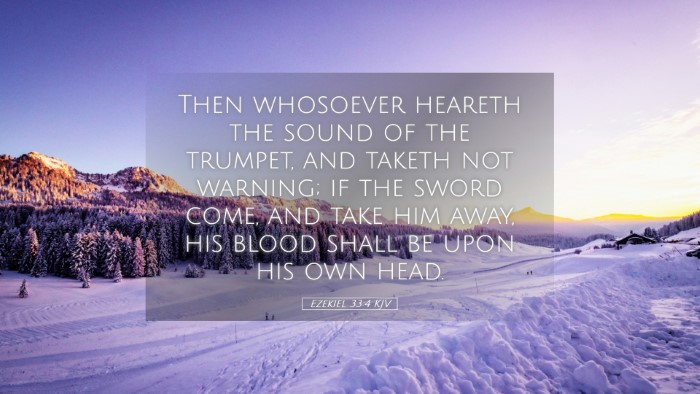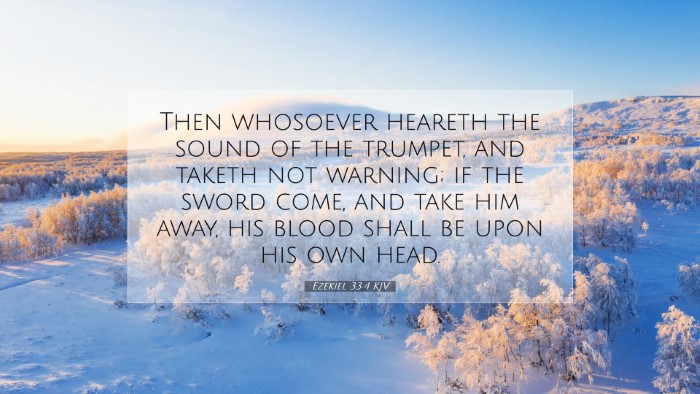Ezekiel 33:4 - Commentary Analysis
Bible Verse: "Then whosoever heareth the sound of the trumpet, and taketh not warning; if the sword come, and take him away, his blood shall be upon his own head."
Introduction
This verse serves as a crucial part of Ezekiel’s role as a watchman for Israel, highlighting themes of warning, responsibility, and accountability. The imagery of a trumpet call is powerful, signaling both alarm and divine communication. Understanding this scripture is essential for a deeper grasp of prophetic ministry and the call to moral responsibility before God.
Contextual Background
The book of Ezekiel is often noted for its vivid imagery and complex theological assertions. In Ezekiel 33, the prophet speaks to the exiled Israelites, conveying messages of judgment and redemption. His unique status as both priest and prophet places him in a position of spiritual authority. This text positions him as a watchman with the responsibility of warning the people about impending danger, encapsulating a recurring theme throughout the prophetic literature.
Exegesis of Ezekiel 33:4
1. The Watchman’s Role
- Matthew Henry emphasizes that the watchman serves as a sentry who must sound the alarm when danger approaches. The sound of the trumpet is a metaphor for the proclamation of God's message, which serves to alert the people of their spiritual jeopardy.
- Albert Barnes suggests that this warning is a grace extended by God to His people, an opportunity for repentance and change. The sounding of the trumpet illustrates God's desire to protect His people from spiritual demise.
- Adam Clarke elaborates on the significance of hearing and heeding the warning. He points out that the responsibility lies not just with the watchman but also with those who hear the message. The effectiveness of a warning is contingent upon the audience's response.
2. The Consequences of Inaction
- Henry notes that should the people ignore the warning, they face the dire consequence of destruction. The phrase "his blood shall be upon his own head" underscores the principle of personal responsibility and accountability before God.
- Barnes elaborates that the text illustrates a profound truth: when one hears the truth of God and fails to act upon it, they cannot lay blame on the messenger nor God Himself; rather, they bear the consequences of their own choices.
- Clarke adds that this concept extends beyond mere physical threats; it encompasses spiritual realities where turning a deaf ear to God's call can lead to eternal separation.
Theological Implications
This verse encapsulates the theological tension between divine sovereignty and human free will. God, in His sovereignty, beckons His people through His messengers, signifying His desire for their salvation and redemption. Yet, the responsibility remains upon the hearers to respond appropriately.
1. God's Mercy and Justice
The balance between mercy and justice is striking in this passage. God’s mercy is exhibited throughout by providing warnings and the opportunity for repentance, while His justice is established by the principle of personal accountability. Henry articulates that failure to heed these warnings merits the consequences of judgment, thereby reinforcing the seriousness of divine warnings.
2. The Nature of the Prophetic Call
The role of the prophet as a watchman not only reflects on the historical context of Ezekiel’s ministry but also serves as a paradigm for future generations. Barnes draws attention to the ongoing relevance of this role within the church today—believers are called to be vigilant, proclaiming the truth of the gospel and urging others towards repentance.
3. The Sound of the Trumpet: Call to Action
The trumpet sound is a metaphor that can be connected to various aspects of Christian life. Clarke notes that it represents not just a warning but also an invitation to respond to God’s grace. Those in leadership today must be aware that they fulfill a simlar role to that of Ezekiel, tasked with warning and guiding their communities.
Application for Modern Believers
The significance of Ezekiel 33:4 extends to contemporary faith communities. The church today stands as a watchman, tasked with proclaiming the truth amid societal turmoil and moral ambiguity. This passage serves as a clarion call to engage in the act of proclamation with urgency and clarity.
1. Embracing the Watchman Role
Pastors and leaders must embrace their roles as spiritual watchmen. This involves not only teaching the Scriptures but also discerning the signs of the times and warning their congregations against spiritual apathy and sin.
2. Encouraging Personal Responsibility
This verse invites each believer to take personal responsibility for their spiritual well-being. The act of listening for God’s warnings and responding in obedience is essential for maintaining a healthy relationship with Him.
3. Fostering a Culture of Response
Churches should cultivate an environment where members are encouraged to act upon the warnings and teachings presented. Barnes suggests that creating forums for dialogue, reflection, and accountability can help believers navigate their responses to God’s calls.
Conclusion
Ezekiel 33:4 is a potent reminder of the responsibility that comes with hearing God’s word. The prophetic call is not merely for the benefit of the individual but is also a communal charge for the church as the body of Christ. As we reflect on the message contained within this verse, may we be diligent in both sounding the alarm and heeding its call.


